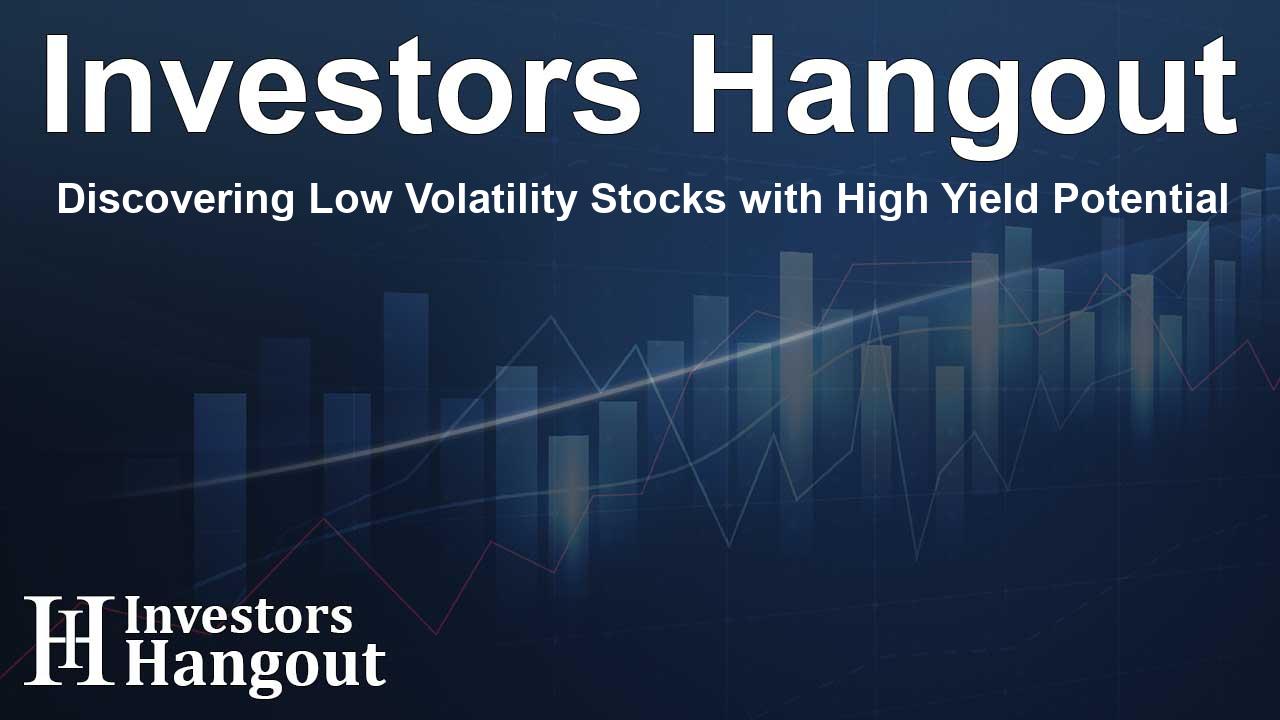Discovering Low Volatility Stocks with High Yield Potential

Navigating Market Stability with Low Beta Stocks
If you're anxious about the market's potential downturns, investing in stocks with low volatility might be a smart strategy. Here, we will explore seven robust stocks that not only provide solid dividends but also exhibit lower volatility compared to market averages. These ‘low beta’ stocks tend to perform better in turbulent times, making them appealing to conservative investors.
Low beta stocks usually fluctuate less than the overall market — stocks with a beta greater than 1 are more volatile, while those with a beta less than 1 are more stable. Therefore, pairing low beta with high dividend yields can provide both income and some cushion against market dips. Let’s dive into some examples of stocks that yield at least 5% and often much higher.
1. Getty Realty
Starting with Getty Realty (NYSE: GTY), boasting a 6.6% yield, this company operates over 1,130 single-tenant retail properties across the nation. Getty has a notable track record of stability, with a 5-year beta of 0.86, indicating it’s less volatile than the market.
Getty generates consistent cash flow largely from convenience stores, accounting for a significant portion of its rental income. This stable tenant base has historically helped the company maintain strong performance and dividend growth, even when facing challenges in the broader real estate sector.
2. AES Corporation
AES Corp. (NYSE: AES) offers a 5.5% yield, operating as a utility that serves 2.7 million customers. Although AES has slightly higher betas than some typical utility firms, its diversification into renewable energy enhances its growth prospects.
This forward-thinking strategy, combined with competitive pricing at just six times earnings estimates, makes AES an attractive consideration for investors valuing stationary returns with potential upside.
3. Northwest Bancshares
Northwest Bancshares (NASDAQ: NWBI) provides a compelling yield of 6.8%. As part of the financial sector, it operates through more than 150 locations across multiple states. Northwest has demonstrated itself to be a solid performer with a focus on lower-risk lending, evident in its low beta of 0.69.
Despite the challenges of maintaining growth, especially after its recent merger, Northwest has the potential to enhance its earnings and restore its dividend in the future.
4. General Mills
General Mills (NYSE: GIS) yields 5.0% and is recognized in the consumer staples sector for its reliability amidst market fluctuations. Although it has faced some downturns, its lower beta indicates that it remains a calmer investment during periods of volatility.
Investors looking for dependable income without extreme fluctuations might still find General Mills appealing, as leading grocery items will always have demand.
5. Kraft Heinz
Kraft Heinz (NASDAQ: KHC), offering a 5.9% yield, similarly falls into the consumer staples category. Despite facing significant challenges recently, its exceptionally low beta reflects its role as a steady income option, albeit with caution due to potential future earnings declines.
6. Conagra Brands
Conagra Brands (NYSE: CAG) offers an alluring 7.4% yield, holding a diverse portfolio of well-known food products. The company’s recent performance has been characterized by fluctuations, with issues like supply chain disruptions impacting operations. A narrower beta reflects its inconsistency, so assessing risk is essential.
However, positive initiatives targeting growth in its product lines could bolster its future, making it worth watching for income investors.
7. Cal-Maine Foods
Lastly, Cal-Maine Foods (NASDAQ: CALM) presents an impressive 8.0% yield. As the leading producer of fresh shell eggs in the U.S., its stocks have shown significant growth recently, although high volatility due to fluctuating egg prices is a critical factor to monitor.
This prominent status could remain a double-edged sword as higher prices result in greater revenues, yet unpredictable market dynamics carry inherent risks for its dividend payouts.
Frequently Asked Questions
What are low volatility stocks?
Low volatility stocks tend to exhibit smaller price fluctuations compared to the overall market, making them generally less risky for investors.
Why invest in stocks with high yields?
High-yield stocks provide an additional income stream through dividends, making them attractive for income-focused investors, especially during volatile market conditions.
What is a beta in stock trading?
Beta is a measure of a stock's volatility relative to the overall market; a beta of less than 1 indicates lower volatility, while greater than 1 indicates higher volatility.
How can these stocks help during a market downturn?
Low beta stocks often experience less price decline during market downturns, helping to provide a buffer for investors during volatile times.
Are high dividend yields always safe?
While high dividend yields can be appealing, they come with risks. Investors should assess the underlying company's financial health and dividend sustainability before investing.
About The Author
Contact Henry Turner privately here. Or send an email with ATTN: Henry Turner as the subject to contact@investorshangout.com.
About Investors Hangout
Investors Hangout is a leading online stock forum for financial discussion and learning, offering a wide range of free tools and resources. It draws in traders of all levels, who exchange market knowledge, investigate trading tactics, and keep an eye on industry developments in real time. Featuring financial articles, stock message boards, quotes, charts, company profiles, and live news updates. Through cooperative learning and a wealth of informational resources, it helps users from novices creating their first portfolios to experts honing their techniques. Join Investors Hangout today: https://investorshangout.com/
The content of this article is based on factual, publicly available information and does not represent legal, financial, or investment advice. Investors Hangout does not offer financial advice, and the author is not a licensed financial advisor. Consult a qualified advisor before making any financial or investment decisions based on this article. This article should not be considered advice to purchase, sell, or hold any securities or other investments. If any of the material provided here is inaccurate, please contact us for corrections.
